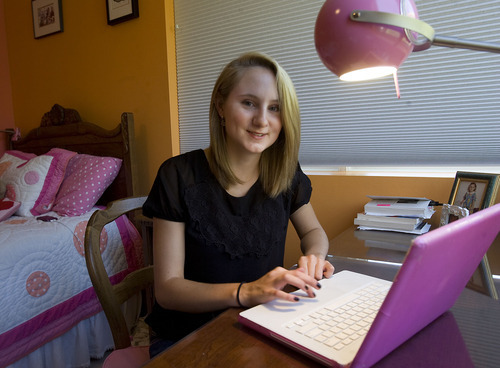This is an archived article that was published on sltrib.com in 2011, and information in the article may be outdated. It is provided only for personal research purposes and may not be reprinted.
When Kellyn Maves packs off to college this time next year, her destination will have been chosen through a deliberative process that most 17-year-olds could hardly imagine.
This summer she toured the northeast, visiting a dozen small, private liberal arts colleges in an effort to winnow her application list to five or six East Coast schools and a few more on the West Coast.
"I want to have a small student-teacher ratio. I want to have a personal experience — I don't want to have graduate students teaching the classes," said Maves, a senior at Rowland Hall, a private Salt Lake City school.
At the center of Maves' journey are her laptop and the Common Application, the one-stop process that enables students to apply to several colleges at once. Students fill out a single form and submit just one set of transcripts and test scores, one essay and one set of recommendations. It has become hugely popular since its launch in 1975 by 15 prestigious schools.
The Common App now has 456 members schools, including more than 60 public colleges and universities and a few foreign ones. Last year, 575,000 students submitted 2.4 million applications online. Students began filing for the 2012 admissions cycle this month, but they have until Dec. 31 to complete their applications.
Private Westminster College is the only Utah school participating. Officials at the small liberal arts school in Salt Lake City credit the Common App, which it joined a few years ago, with helping to broaden the geographic diversity of the student body. About 40 percent of the incoming freshman class come from outside Utah, and many applied through the Common App.
"There is a strong affinity among schools in the Common App that Westminster needed to align itself with," said Joel Bauman, vice president for enrollment. "It makes us more accessible to students who are more educated about the admissions processes."
The Common App requires its member schools to use "holistic" admissions criteria; that is, consider personal essays and recommendations — a provision that rules out the University of Utah and the state's public schools. (Among the U.'s new peers in the Pac-12, only the private Stanford and University of Southern California are Common App members.)
Brigham Young University, run by The Church of Jesus Christ of Latter-day Saints, is Utah's most selective institution and is unlikely to ever join because its students are expected to live up to the faith's rigorous moral standards.
All Rowland Hall graduates go to college, and the majority, like Maves, look out of state and use the Common Application, according to Bruce Hunter, the school's director of counseling.
Maves, a runner who competes in track and cross-country, intends to minor in French but remains undecided about a major. Her dream school is a small campus with strong language and arts programs. Her East Coast candidates are expensive, selective schools located mostly in small New England towns. Her recent tour took her to A-list schools like Brown, Bowdoin, Williams and Colby, but her top pick will likely be Middlebury or Wesleyan.
"I have been researching small liberal arts colleges, and they keep popping up on lists of the best schools," Maves said. Both are longtime Common App stalwarts.
In fact, last year, Middlebury stopped accepting applications through any other means, and it still broke its record for the number received, more than 8,500. Nearly one-fifth were invited to join what eventually became its freshman class of 700 students, according to admissions dean Greg Buckles.
Some observers are concerned the Common App is driving up application numbers and thereby the apparent selectivity of top-choice schools.
"Those concerns are outweighed by the positive benefits. It enhances the access and efficiency of applying to college," Buckles said. "If Middlebury can attract students from Utah or others who wouldn't have thought of Middlebury, I'm all for it."
Applying might be easy, but students should never take it lightly, Rowland Hall's Hunter cautioned.
Maves is using her senior writing class to hone her personal essay, a 250-to-500-word statement that needs to distinguish her from thousands of other high achievers. Near the end of their junior year, Rowland Hall students are given the Common App form and asked to examine the choices of essay topics to identify things or people in their lives that are relevant to them.
"It isn't a matter of it having to be perfect as much as you need to be thoughtful and give yourself lead time as you would with any important writing assignment," Hunter said. "All five questions are asking the same question, which is, 'Who are you? Who are you as a student, a person, a member of your family, a part of a community?' "
Each school may pose one supplemental question, usually asking why the student wants to study on its campus.
"That's a positive development," Hunter said. "It requires kids to stop and think about the possible connection between themselves as students and what they want to learn and the culture and environment and intellectual rigor of the college where they are applying. There are a lot colleges that really cut on that."
Middlebury, however, dropped its supplemental question last year.
"We were not getting a lot of depth to the answers we needed," Buckles said.
While Maves may single out Middlebury for an "early decision" application, she will apply to the University of Utah. Just in case.
"My parents want me to apply to one school that I'm certain to get in to," she said. "The U. is so much cheaper, so it's a comfort to them. They are having a hard time with how much it costs to go to these colleges."
Common Application
College-bound students are increasingly turning to this one-stop process for applying to several colleges at once. Initially limited to selective private schools, the program has expanded to included several state schools. Still, few institutions in the Intermountain West are members, and Westminster College remains the only Utah school to sign up.
For more information see http://www.commonapp.org.







